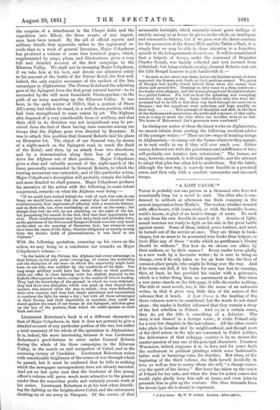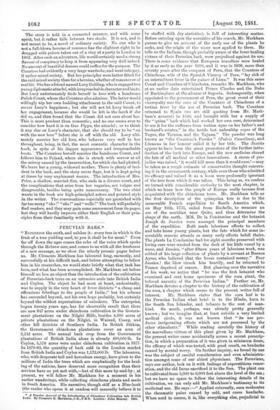"A LOST CAUSE."
THERE is probably not one person in a thousand who does not occasionally long for a novel to read. The idler who is con- demned to solitude at afternoon tea finds company in the newest importation from Mudie's. The worker, whether wearied with office-hours, with brain-work, or with the humbler house- maid's broom, is glad of an hour's change of scene. No need. to stir from his own fireside in search of it. Armies of light- armed warriors are ready to fight on his side in the great battle against ennui. Some of them, indeed, prove traitors, and must be turned out of the service at once. They are things in book- shapes, but no more to be accounted true books than ledgers, or (teste Elia) any of those "works which no gentleman's library. should be without." But how do we choose our allies, by their authors, or by their names Every reader turns gladly- to a new work by a favourite writer ; he is sure to bring us change, even if he only takes us for an hour into the lives of common-place people, who might be living over the way. And: if he turns out dull, if his brain for once has lost its cunning, then, at least, he has provided his reader with a grievance, which is a better thing than no amusement at all. But when a new name stands on the title-page, it tells the reader nothing.. The title of most novels, too, is like the name of an unknow to writer, in that it gives very little idea of the nature of the volumes that it heads. A Lost Canse is the heading of the three volumes now to be considered, but the words do not stand alone ; the reader is further informed that they contain a story of the last rebellion in Poland. And so, in a certain sense,. they do, yet the title is something of a delusion. The story is not framed in a foreign scene ; it visits Poland only for a very few chapters in the last volume. All the other events take place in London and its neighbourhood, and though most of the chief actors in the tale are concerned in Polish politics, the deliverance of that unhappy country is by no means the. master-passion of any one of the principal characters. Countess. Woronzow, indeed, supposes it to be hers, and for years finds. the excitement in political plottings which some fashionable ladies seek in bartering votes for charities. But when, at the beginning of the third volume, she finds herself decidedly in, love, as well as free to marry whom she will, "a change comes. o'er the spirit of her dream." Her lover has taken up the cause. of Poland for her sake, and when the time for action comes she would right gladly keep him safe at home, and even tries to persuade him to give up the venture. She thus descends front the heroic type she is meant to represent.
• A Lost Cause. By W. W. Aldred. London: Allen and Co. The story is told in a connected manner, and with some spirit, but it rather falls between two stools. It is not, and is not meant to be, a novel of ordinary society. No one who is not a full-blown heroine of romance has the slightest right to be drugged with poison taken out of a ring at a party in London in 1862. After such an adventure, life would certainly need a strong flavour of conspiracy to keep it from appearing very dull indeed. No amount of beautiful dresses could suffice for the purpose. The Countess had evidently a very large wardrobe, and went into gay, if rather mixed society. But her principles were better fitted for the said mixed society than for a heroine, whether of romance or of real life. She has a friend named Lucy Golding, who is engaged to a young diplomatic attache, with irreproachable character and boots. But Lucy unfortunately finds herself in love with a handsome Polish Count, whom the Countess also admires. The latter would willingly nip her own budding attachment to the said Count, to secure Lucy's happiness ; but she will not let Lucy break off her engagement, because she would be left in the lurch if she did so, and then found that the Count did not care about her. This is more prudent than romantic ; and no one seems ever to consider how hard it is on Gus Fipps, the attaché ; or to think it any slur on Lucy's character, that she should try to be "on with the new love" before she is off with the old. Lucy ulti- mately marries her old love, who behaves very well to her throughout, being, in fact, the most romantic character in the book, in spite of his dapper appearance and irreproachable boots. The Countess herself marries the handsome Count, and follows him to Poland, where she is struck with sorrow at all the misery caused by the insurrection, for which she had plotted. We leave her a young, widowed mother. There is plenty of inci- dent in the book, and the story never flags, but it is kept going at times by very unpleasant means. The introduction of Mrs. Price, a shallow, married flirt, who ends in a divorce court, and the complications that arise from her vagaries, are vulgar and disagreeable, besides being quite unnecessary. The two chief wants in the book are high-principled actors and pointed style in the writer. The conversations especially are garnished with
far too many " ohs !" " !" and" wells !" The book will probably find readers, and they may gain some amusement from its pages, but they will hardly improve either their English or their prin- ciples from their familiarity with it.































 Previous page
Previous page